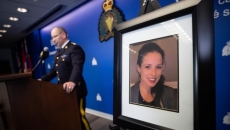ST. JOHN'S, N.L. - The highly transmissible Omicron variant is forcing mathematicians to rework the models that have helped shaped Canada's understanding of COVID-19, as well as the country's response to the pandemic.
Everything from who gets tested to who's most likely to contract the virus has changed with the latest wave of the pandemic, and that's posing distinct challenges for those who model its impact, says Caroline Colijn, an associate professor of mathematics at Simon Fraser University in British Columbia.
In particular, Colijn said it will be difficult to understand the severity of the disease as it spreads through a mostly vaccinated public.
"We're still adapting to flying blind in terms of reported cases," she said in an interview. "Hospitalizations are lagging and there's not always good data on them, and (hospitalization numbers) won't tell you as directly about infections as reported cases will."
Better hospitalization data could help — like daily admission numbers for COVID-19 patients as well as stats on those who were hospitalized for other reasons but tested positive for COVID-19 while in care — but it's complicated, she said.
For example, if hospitalizations are low, like they are in Newfoundland and Labrador, that kind of information could be a privacy breach. "It's a challenge," Colijn said.
As the Omicron variant drove weeks of record-breaking case counts across the country, provincial governments stopped testing for every possible case of COVID-19 — the testing and tracing demand was overwhelming and it was impossible to keep up. Instead, provinces such as British Columbia, Ontario and Newfoundland and Labrador are now only testing for cases among those who have a higher risk for infection and hospitalization, like people in long-term care homes.
That means many cases will be missed, while daily case counts and test positivity rates — the percentage of tests that come back positive — don't reflect what's happening in the general population.
Really, the definition of a positive case has changed, says Jane Heffernan, an associate professor of mathematics at York University. "The models then have to change to accommodate that," she said in an interview, adding: "In mathematics, in order to be able to measure something, you first have to define what you're measuring."
Model overhauls are expected in any flu season, but there are many other complications with Omicron, Heffernan added, such as how it infects unvaccinated and vaccinated people — the latter with all possible combinations of doses.
With the other variants, Heffernan said she could go back to her models and shift a few variables. Not so with Omicron.
"Since we're trying to track mild, moderate and severe infections, we can't just tweak a parameter because having two doses of vaccine versus one dose versus different ages and when different ages had their different rollouts and their boosters — all of that affects the structure of the model," she said.
In short: "Omicron has certainly complicated a lot of our lives."
For Amy Hurford, a mathematics professor at Memorial University of Newfoundland and Labrador, the most difficult part of modelling Omicron has been its speed of transmission.
Its doubling times — the time it takes for the number of infected people to double — are among "some of the fastest we've seen in the pandemic," she said. The rapid spread has meant governments needed answers about what was happening before scientists could see how the variant was playing out.
"We've been trying to answer questions with a lot of uncertainty," she said.
Mathematicians have been much more involved with COVID-19 than with the previous SARS and H1N1 swine flu pandemics, Heffernan said.
"Before the pandemic really started in Canada, there was already modelling involved," she said. "Some modellers were seconded by their provincial governments to work on it."
She, Colijn and Hurdford all hope the increased attention on mathematics and how it can contribute to pandemic responses and even public health will help change the way people see the field, and even encourage more people to enter it.
"I hope that this has helped people see math as not just this abstract thing you learned in high school and then never see again, or even something you hated in school," Colijn said. "(Mathematical modelling) is one of the only tools we have to think at the level of the whole population."






